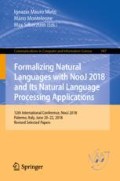Abstract
This paper presents the first version of an automated French-Quechua conjugation system of verbs. Using the key structure of Quechua Undefined Tense conjugation and the transformations induced by Interposed suffix IPS sets, I built a complete system of paradigms. I used NooJ linguistic platform to formalize the morpho-syntactic grammar and this serves to automatically obtain the entire set of conjugated forms of transitive, intransitive and impersonal verbs in all tenses, moods, aspects and voices.
Access this chapter
Tax calculation will be finalised at checkout
Purchases are for personal use only
Notes
- 1.
See (Duran 2013, 2014).
- 2.
See (Silberztein 2003, 2015).
- 3.
- 4.
“It is a conjugation where time is not expressed, only the person is” Itier 1997, p. 68. We call it undefined tense because it can simultaneously indicate: the present, rimani /je parle (I speak); the accomplished past rimani ñaqa/ j’ai parlé tout à l’heure (I spoke earlier) or the habitual aspect rimani sapa punchaw/ je parle tous les jours (I speak every day).
- 5.
For a detailed definition of tense, moods, and aspects in Quechua, see Duran (2017).
- 6.
See (Silberztein 2003, 2015).
- 7.
See Dictionnaire Quechua-Français-Quechua (2009)
- 8.
See (Duran 2013, 2014)
- 9.
In Quechua, this tense expresses established facts when the speaker is not aware of them or when the speaker does not witness them.
- 10.
Duran (2017).
References
Berment, V.: http://www.lingwarium.org/
Dubois, J., Dubois-Charlier, F.: Les verbes français. Larousse, Paris (1997)
Duran, M.: Formalizing Quechua verbs Inflexion. In: Proceedings of the NooJ 2013 International Conference, Saarbrücken (2013)
Duran, M.: Dictionnaire Quechua-Français-Quechua. Editions HC, Paris (2009)
Duran, M.: Morphological and syntactic grammars for recognition of verbal lemmas in Quechua. In: Proceedings of the NooJ 2014 International Conference and Workshop, Sassari (2014)
Duran, M.: Dictionnaire électronique français-quechua des verbes pour le TAL. Thèse Doctorale. Université de Franche-Comté. Mars 2017 (2017)
Silberztein, M.: NooJ Manual (2003). http://www.nooj4nlp.net (220 pages updated regularly)
Silberztein, M.: La formalisation du dictionnaire LVF avec NooJ et ses applications pour l’analyse automatique de corpus. Langages 3/2010 (no. 179-180), pp. 221–241 (2010)
Silberztein M.: La formalisation des langues. L’approche de NooJ, ISTE edn. London (2015)
Author information
Authors and Affiliations
Corresponding author
Editor information
Editors and Affiliations
Rights and permissions
Copyright information
© 2019 Springer Nature Switzerland AG
About this paper
Cite this paper
Duran, M. (2019). An Automated French-Quechua Conjugator. In: Mirto, I., Monteleone, M., Silberztein, M. (eds) Formalizing Natural Languages with NooJ 2018 and Its Natural Language Processing Applications. NooJ 2018. Communications in Computer and Information Science, vol 987. Springer, Cham. https://doi.org/10.1007/978-3-030-10868-7_1
Download citation
DOI: https://doi.org/10.1007/978-3-030-10868-7_1
Published:
Publisher Name: Springer, Cham
Print ISBN: 978-3-030-10867-0
Online ISBN: 978-3-030-10868-7
eBook Packages: Computer ScienceComputer Science (R0)

